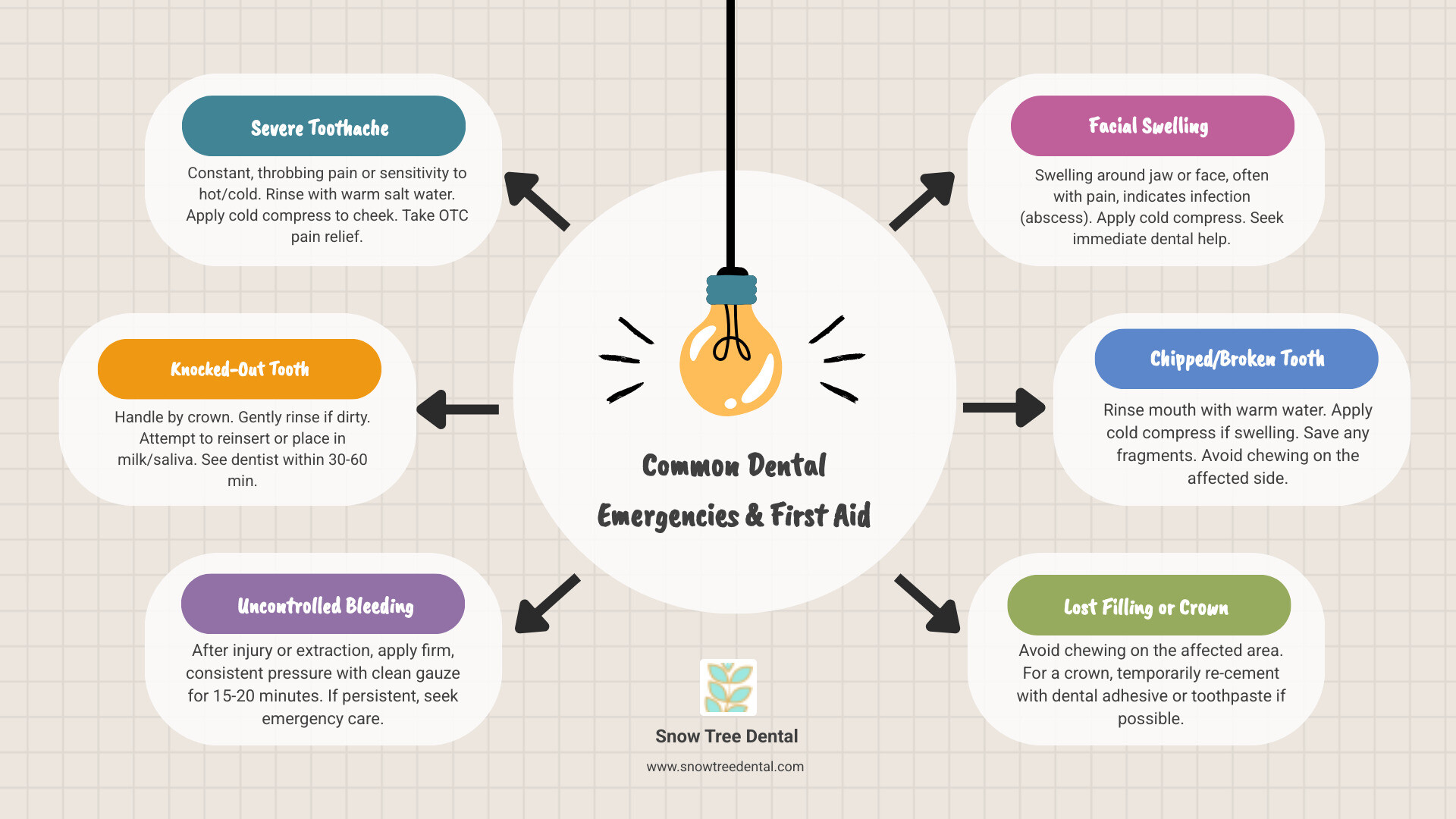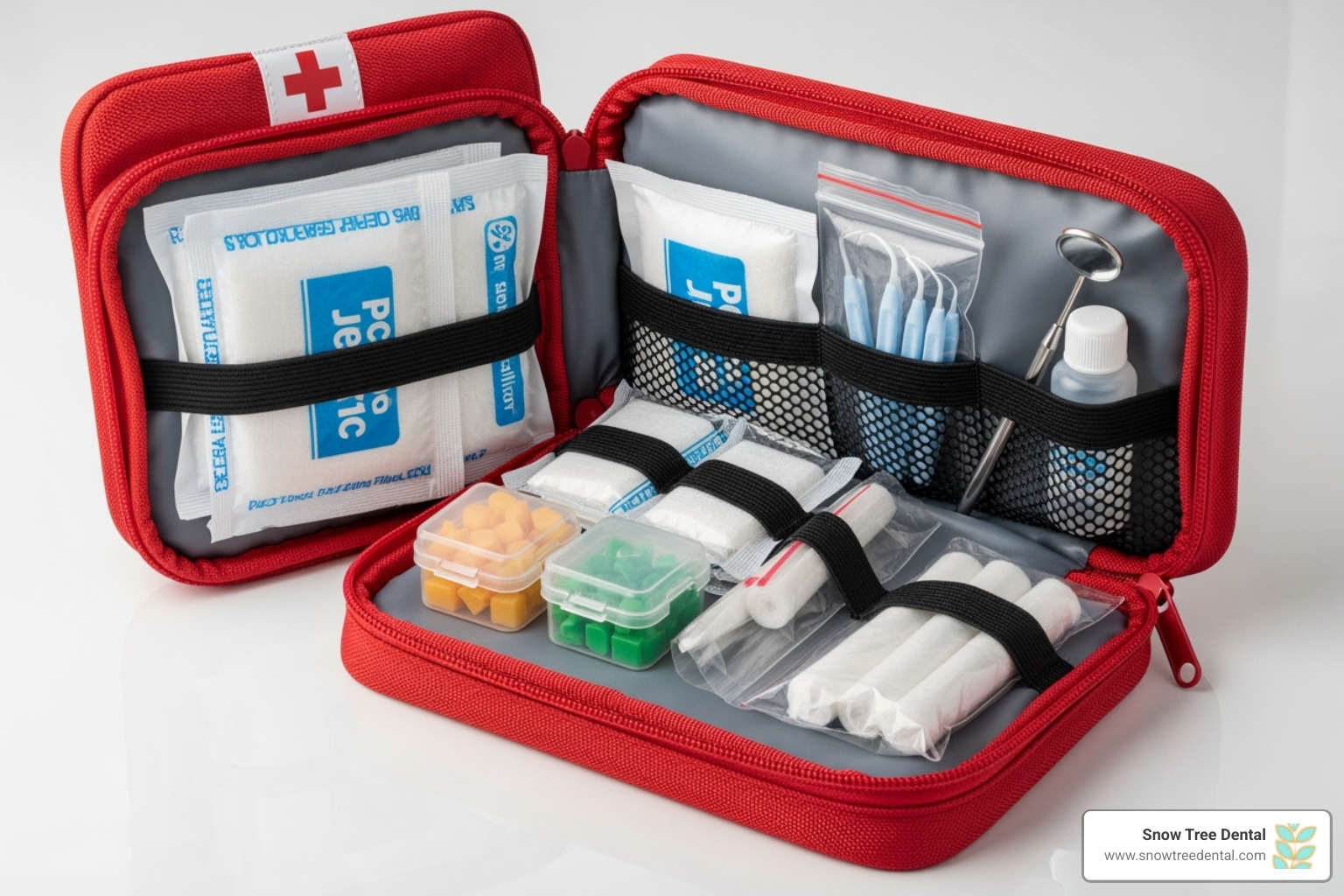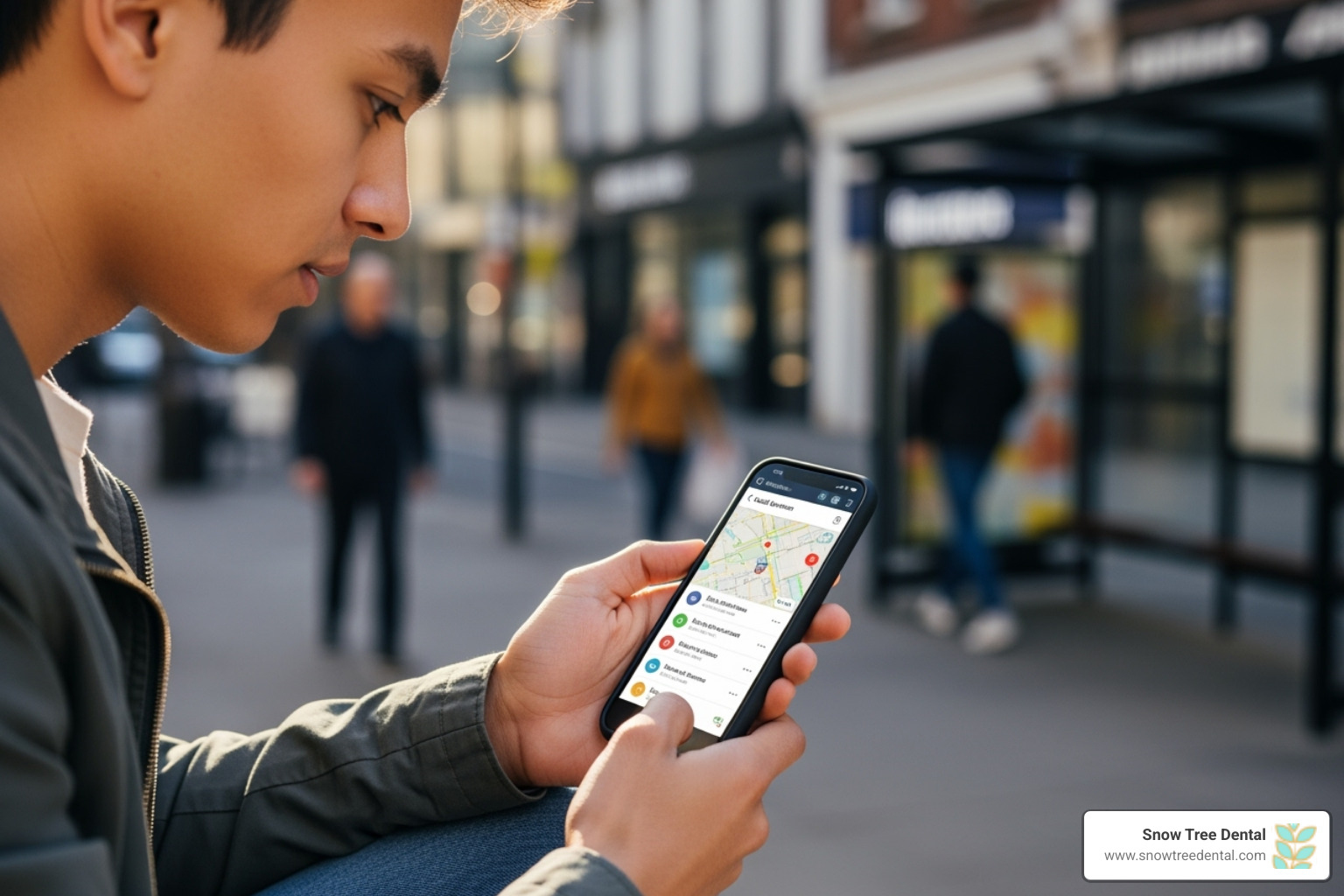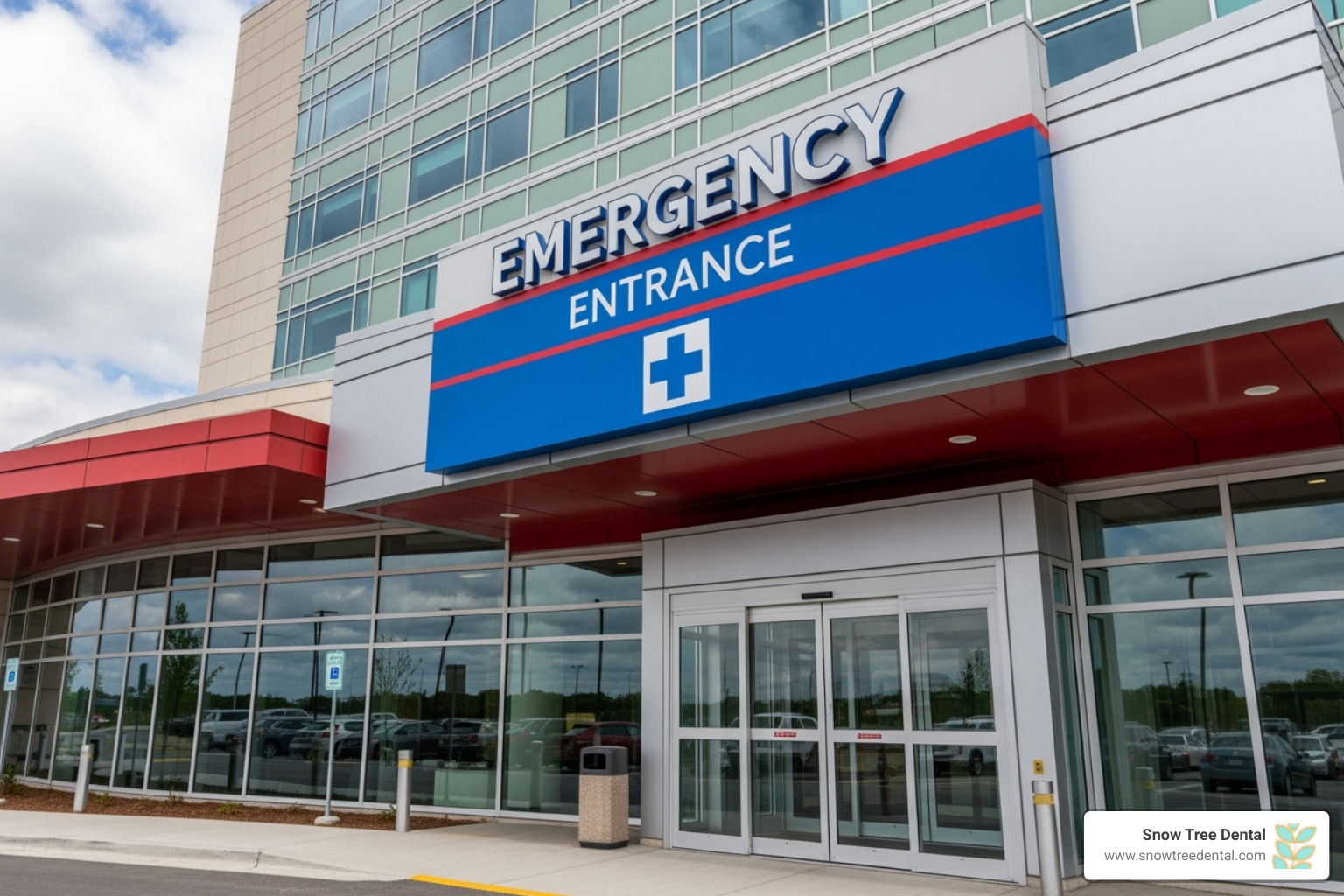24 hour dentist near me: Urgent 1-Step Relief
When Dental Pain Can’t Wait: Your Guide to Emergency Care
When you need a 24 hour dentist near me, every minute counts. Dental emergencies don’t follow regular business hours – they happen at midnight, on weekends, and during holidays when most dental offices are closed.
Quick ways to find emergency dental care:
- Search online for “emergency dentist + your city” – Look for clinics with extended hours or on-call services
- Check hospital emergency rooms – They can provide pain relief and antibiotics for severe infections
- Contact your regular dentist – Many have after-hours emergency numbers
Dental emergencies can happen at any time. Research shows that dental emergencies require swift action to prevent larger, more serious problems from occurring. A severe toothache can prevent you from eating or sleeping, while a knocked-out tooth has the best chance of being saved if you act within the first hour.
Common signs you need emergency dental care include constant pain lasting more than 15-20 seconds after hot or cold exposure, uncontrolled bleeding, facial swelling, or a knocked-out tooth. These situations can’t wait until Monday morning.
I’m Dr. Muna Mohammad, and I’ve helped countless Houston residents steer dental emergencies throughout my career at Snow Tree Dental. My experience has shown me that knowing how to quickly find a 24 hour dentist near me can make the difference between saving and losing a tooth. Let me walk you through exactly what to do when dental pain strikes outside normal business hours.
Step 1: Identify if You Have a Dental Emergency
Not every dental issue requires a frantic search for a 24 hour dentist near me. But when it does, knowing the difference between “this can wait until Monday” and “I need help now” can save your tooth—and possibly prevent a serious infection.
Think of dental emergencies like any other medical emergency. A dental emergency is any condition that requires immediate treatment to stop severe pain, control bleeding, or save a tooth. The key word here is “immediate.” These aren’t situations where you can tough it out with over-the-counter pain relievers and hope for the best.
When you ignore true dental emergencies, small problems become big ones fast. That nagging toothache can turn into a dangerous infection. A loose tooth can fall out completely. What might have been a simple filling could end up requiring a root canal or extraction.
| Needs Emergency Care | Can Wait for Regular Appointment |
|---|---|
| Severe, constant pain that prevents sleep | Mild, intermittent discomfort |
| Uncontrolled bleeding from mouth | Minor gum bleeding during brushing |
| Facial swelling or swelling that affects breathing | Small, painless chip in tooth |
| Knocked-out permanent tooth | Lost filling without pain |
| Visible abscess or pus-filled bump | Dull toothache without swelling |
| Broken tooth with exposed nerve | Loose bracket on braces |
Recognizing the Signs of a Serious Dental Problem
Your body has a way of telling you when something’s seriously wrong. With dental emergencies, the signs are usually pretty clear—if you know what to look for.
Severe, constant pain tops the list of emergency signs. We’re not talking about a little sensitivity when you drink something cold. This is the kind of pain that makes you pace the floor at 2 AM, unable to sleep or think about anything else. If pain lasts longer than 20 seconds after hot or cold exposure, your tooth’s nerve might be dying or infected.
Uncontrolled bleeding from your mouth, especially after an injury, demands immediate attention. A little blood when you brush your teeth is one thing. Blood that won’t stop flowing after you’ve applied pressure for several minutes is entirely different.
Swelling anywhere in your mouth, gums, or face often signals a serious infection. When swelling spreads to your jaw or neck, or if it makes breathing or swallowing difficult, you’re dealing with a life-threatening emergency that might require a hospital visit instead of just a dental office.
A knocked-out tooth creates a race against time. You have roughly 30 minutes to an hour to get that tooth back where it belongs if you want the best chance of saving it. After that window closes, your options become much more limited and expensive.
Exposed nerves from a broken or chipped tooth cause excruciating pain and leave your tooth vulnerable to infection. Even if the pain comes and goes, that exposed nerve needs protection right away.
Difficulty breathing or swallowing combined with dental pain suggests the infection is spreading. This moves beyond dental emergency territory into medical emergency—head to the nearest emergency room.
Any jaw injury that affects how you open and close your mouth, causes severe pain, or creates visible misalignment needs immediate evaluation. Jaw fractures don’t heal properly on their own.
For more detailed information about recognizing dental emergencies, check out A guide to dental emergencies.
What to Do for Common Dental Emergencies Before You Get Help
While you’re searching for a 24 hour dentist near me, the right first aid can make a huge difference in saving your tooth and managing your pain. Think of these steps as buying yourself time until professional help arrives.
For a knocked-out tooth, every second counts. Pick up the tooth by the crown—never touch the root, as you can damage the cells needed for reattachment. If it’s dirty, give it a gentle rinse with water, but don’t scrub it. Try to slip it back into its socket if you can, making sure it faces the right direction. Can’t get it back in? Keep it moist in a small container filled with milk, your saliva, or a tooth preservation product. Plain water will actually damage the root cells, so avoid that.
Chipped or broken teeth need gentle care. Rinse your mouth with warm water to clean the area, then apply gauze if there’s bleeding. A cold compress on the outside of your cheek helps control swelling and numbs the pain. Save any tooth fragments you can find—sometimes we can reattach them.
Lost fillings or crowns leave your tooth vulnerable and often painful. Rinse with warm water, then protect the exposed area with over-the-counter dental cement or even sugar-free gum as a temporary measure. If you have the crown, you might be able to gently place it back using toothpaste as temporary adhesive—but don’t force it.
For severe toothaches or abscesses, start with a warm salt water rinse (half a teaspoon of salt in a cup of warm water). This helps clean the area and reduce inflammation. Gently floss around the tooth to remove any trapped food particles. A cold compress on your cheek provides pain relief, and over-the-counter pain relievers help too. Never put aspirin directly on your gums—it can cause chemical burns. And resist the urge to try draining an abscess yourself, as this can spread the infection.
These are temporary measures to help you cope until you can get professional care. They’re not substitutes for seeing a dentist, but they can help preserve your tooth and manage your pain during those crucial first hours of a dental emergency.
Step 2: How to Find a 24 hour dentist near me
When dental pain hits at midnight or your tooth gets knocked out during a weekend game, panic can set in quickly. The good news? Finding a 24 hour dentist near me is more manageable than you might think, especially when you know where to look.
Your smartphone is your best friend in a dental emergency. Start with online searches using specific terms like “emergency dentist Houston TX,” “after-hours dentist,” or “dentist open weekends.” Don’t just search “dentist” – you need someone who’s actually available when regular offices are closed. Look for websites that clearly state “emergency care,” “24/7 availability,” or “weekend appointments.”
Your regular dentist might surprise you. Even if they don’t advertise as a 24 hour dentist near me, many have answering services or emergency contact numbers. They often work with on-call dentists or can guide you to trusted colleagues who handle after-hours emergencies.
Hospital emergency rooms deserve a mention, but with an important caveat. ERs can handle severe facial trauma, uncontrolled bleeding, or infections that affect your breathing. However, they’re not equipped for most dental procedures. You’ll likely receive pain medication and antibiotics, then get referred to a dentist anyway. It’s often faster to go straight to an emergency dentist.
What Information to Have Ready When You Call
When you’re in pain, the last thing you want is to fumble around looking for information while on the phone with an emergency dentist. Having key details ready speeds up the process and helps the dental team assess your situation quickly.
Personal and insurance details come first – your full name, date of birth, phone number, and dental insurance information if you have it. Don’t worry if you don’t have insurance; many practices offer transparent pricing and payment plans.
Describe your symptoms clearly. Is it throbbing pain that keeps you awake? Constant bleeding that won’t stop? Swelling that’s getting worse? The more specific you are, the better the dentist can prioritize your case and prepare for your visit.
Location matters too. “My tooth hurts” isn’t as helpful as “my upper left molar is throbbing” or “my front tooth is chipped and sharp.” If you know what caused the problem – biting something hard, a fall, a sports injury – mention that as well.
Current medications and medical conditions are crucial for safe treatment. This includes prescription drugs, over-the-counter pain relievers you’ve already taken, and any allergies. If you have diabetes, heart conditions, or other health issues, let them know upfront.
What Services to Expect from an Emergency Dentist
A 24 hour dentist near me focuses on one main goal: getting you out of pain and preventing further damage. They’re not there to give you a routine cleaning – they’re equipped to handle urgent situations that can’t wait until Monday morning.
Pain relief tops the priority list. Whether through local anesthesia, prescription medications, or immediate procedures to stop severe toothaches, emergency dentists understand that managing your discomfort comes first.
Tooth extractions become necessary when a tooth is too damaged to save. While it’s always a last resort, removing a severely infected or fractured tooth can provide immediate relief and prevent the spread of infection to other areas.
Root canal therapy might sound scary, but it can be a tooth-saver during emergencies. When infection reaches the nerve of your tooth, an emergency root canal removes the infected tissue and can eliminate excruciating pain almost instantly.
For dental abscesses, emergency dentists can drain the infection to relieve pressure and prescribe antibiotics. This type of infection won’t go away on its own and can become dangerous if left untreated.
Broken tooth repairs vary depending on the damage. Sometimes it’s smoothing rough edges, other times it involves temporary fillings or bonding to protect exposed nerves. Re-cementing loose crowns or fillings is another common emergency service that prevents further damage to vulnerable teeth.
Emergency dentists also handle gum injuries, assess trauma from accidents, and provide initial treatment for knocked-out teeth. The key is stabilizing your condition and getting you comfortable.
Emergency care focuses on immediate problems. You’ll likely need follow-up appointments for comprehensive treatment. At Snow Tree Dental, we provide both emergency services and complete follow-up care. You can learn more about our full range of emergency dental services and how we make quality dental care accessible when you need it most.
Step 3: Understanding the Costs and What to Expect
I know that when you’re dealing with dental pain at 2 AM, the last thing you want to worry about is cost. But let’s be honest – emergency dental care is an unexpected expense that catches most people off guard. The good news? Many dental practices, including ours at Snow Tree Dental, work hard to make emergency care accessible without breaking the bank.
Emergency consultation fees typically start with an initial examination charge, similar to what you’d pay at an urgent care center. This covers the dentist’s time to assess your situation, take necessary X-rays, and determine the best course of action.
Treatment costs vary significantly based on what’s actually wrong. Re-cementing a loose crown might cost much less than an emergency root canal or extraction. The complexity of your situation drives the price – a simple pain relief procedure will always cost less than complex restorative work.
Dental insurance can help significantly with emergency costs. We accept most dental insurance plans at Snow Tree Dental, and our team can help you understand exactly what your coverage includes. Bring your insurance card and policy information when you call – it helps us give you accurate cost estimates upfront.
Payment plans and financing options exist because we understand that dental emergencies don’t wait for payday. We offer several financing solutions and an in-house dental plan that makes quality emergency care more manageable. You shouldn’t have to choose between financial stress and getting the pain relief you desperately need.
Transparent pricing means no surprise bills later. At Snow Tree Dental, we discuss all costs before we begin any treatment. You’ll know exactly what to expect, which helps you make informed decisions about your care even when you’re in pain.
The reality is that emergency dental care costs vary widely depending on your specific needs, but having options and understanding your choices ahead of time makes the whole experience less stressful.
When to Go to the ER Instead of an Emergency Dentist
While searching for a 24 hour dentist near me is usually your best bet for dental problems, there are times when the hospital emergency room is actually the safer choice. These situations typically involve life-threatening complications or severe trauma that goes beyond what a dental office can handle.
Uncontrolled bleeding that won’t stop after applying firm pressure for 10-15 minutes needs immediate medical attention. This isn’t the minor bleeding you might see with gum irritation – we’re talking about heavy, continuous bleeding that could indicate a deeper injury or medical condition.
Severe facial trauma from car accidents, sports injuries, or falls requires emergency room care, especially if you suspect broken facial bones, have lost consciousness, or have other injuries beyond your mouth. The ER has the imaging equipment and specialists needed to assess complex trauma.
Jaw fractures need immediate medical evaluation. If you can’t move your jaw properly, have severe pain when trying to open or close your mouth, or notice obvious misalignment after an injury, head to the ER first.
Swelling that affects your breathing is a medical emergency. Sometimes a dental infection can spread to your neck or throat, making it difficult to breathe or swallow. If facial swelling is spreading rapidly or you’re having trouble breathing, call 911 or get to an emergency room immediately.
Here’s the thing about ERs and dental problems – they’re great at handling medical emergencies, but they typically can’t provide actual dental treatment. They can manage your pain, prescribe antibiotics for infections, and stabilize trauma, but you’ll likely still need to see a dentist for the actual dental work once your medical condition is stable.
After over 30 years of helping patients with dental emergencies, I’ve seen many frustrated people who went to the ER for tooth pain, only to be given pain medication and told to see a dentist anyway. For most dental issues that don’t involve the serious complications mentioned above, a 24 hour dentist near me will get you the specific care you need much more efficiently.
Frequently Asked Questions about Finding a 24 hour dentist near me
When dental pain strikes at 2 AM or your tooth gets knocked out during a weekend soccer game, the questions start flooding in. Over my years at Snow Tree Dental, I’ve heard these same concerns from countless patients who find themselves in dental emergencies. Let me address the most common questions to help you steer these stressful situations.
What should I do if I have a dental emergency outside of regular business hours?
First, take a deep breath. I know it’s easier said than done when you’re in pain, but staying calm helps you make better decisions. Panic can cloud your judgment when you need to act quickly and thoughtfully.
Start by assessing what’s happening. Use the warning signs we discussed earlier – is this severe, constant pain that won’t let up? Are you dealing with uncontrolled bleeding? Is there swelling in your face or mouth? These symptoms tell you this can’t wait until Monday morning.
Take those immediate first-aid steps we covered. Rinse with warm salt water for a toothache, apply a cold compress to reduce swelling, or carefully save any tooth fragments if you’ve had a break or chip. These actions can provide some relief and potentially save your tooth while you’re getting professional help.
Don’t try to tough it out. I’ve seen too many patients who waited, hoping the pain would go away on its own. Severe dental pain and swelling are your body’s way of telling you something serious is happening. Ignoring these signs often leads to more complex problems and higher treatment costs down the road.
Call a *24 hour dentist near me right away.* Many practices, including ours at Snow Tree Dental, offer after-hours emergency services. We understand that dental emergencies don’t follow a 9-to-5 schedule, which is why we’re available when you need us most – even during those middle-of-the-night emergencies.
How can I find a 24 hour dentist near me that is open on weekends or holidays?
Finding weekend and holiday dental care requires a more targeted search approach, since not every dental practice offers these extended hours. The key is being specific about what you’re looking for.
When searching online, use precise terms like “emergency dentist open Saturday Houston” or “dentist open Sunday.” Adding your location helps narrow down results to practices actually available in your area. Generic searches often return regular business listings that won’t help you at 10 PM on a Friday night.
Check dental practice websites directly rather than relying solely on search results. Many clinics that offer extended hours prominently display this information on their homepage or emergency services page. Look for phrases like “weekend appointments available,” “after-hours care,” or “7 days a week service.”
At Snow Tree Dental, we prioritize making emergency care accessible when you need it most. We offer flexible scheduling that includes evenings, Saturdays, and same-day emergency appointments because dental pain doesn’t wait for convenient timing.
Can I get a same-day appointment for a dental emergency?
Absolutely! The whole point of emergency dentistry is providing immediate relief when you need it most. Most 24 hour dentist near me services prioritize same-day care for genuine emergencies.
Call as early as possible to secure your spot. While we do our best to accommodate walk-ins, having an appointment typically means shorter wait times and guaranteed care. The earlier you call, the more options we have for fitting you into the schedule.
Be clear about your symptoms when you call. Describing your pain level, any swelling, or what caused the injury helps us understand the urgency. This information allows us to prioritize cases appropriately – someone with a knocked-out tooth might need to be seen before someone with a minor chip.
Stay flexible with timing if possible. Emergency schedules can be unpredictable, and being open to the first available slot gets you out of pain faster. I’d rather see you at an inconvenient time than have you suffer through another night of agony.
At Snow Tree Dental, we’re committed to providing same-day treatment for most emergency situations. Our goal is getting you out of pain as quickly as possible while providing the comprehensive care you need to prevent future problems.
Get the Urgent Dental Care You Need in Houston
When a dental emergency strikes, you don’t have time to waste. Every minute counts when you’re dealing with severe tooth pain, a knocked-out tooth, or facial swelling that could indicate a serious infection.
Throughout this guide, we’ve walked you through the essential steps: recognizing the signs of a true dental emergency, taking immediate first-aid action to manage pain and protect damaged teeth, and knowing exactly how to find a 24 hour dentist near me when regular offices are closed.
The reality is that dental emergencies are stressful enough without having to worry about where to get help or whether you can afford treatment. That’s why having a dental team you can trust – one that offers flexible scheduling for emergencies, transparent pricing, and compassionate care – makes all the difference when you’re in pain.
At Snow Tree Dental, we understand that dental emergencies don’t follow a 9-to-5 schedule. Whether it’s a Saturday morning sports injury or a middle-of-the-night toothache that has you pacing the floor, we’re here to help. Our team combines modern technology for comfortable treatment with the kind of personal attention that puts anxious patients at ease.
We know that unexpected dental costs can add stress to an already difficult situation. That’s why we offer flexible payment options and our in-house dental plan to make quality emergency care accessible when you need it most. Because when you’re dealing with dental pain, the last thing you should worry about is how you’ll pay for relief.
Don’t let dental pain control your life or risk serious complications by waiting. Swift, professional action can save your tooth and get you back to feeling like yourself again.
Book your appointment for our dental services today and experience the difference that comprehensive, compassionate emergency dental care can make.








